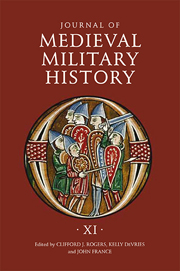Book contents
- Frontmatter
- Contents
- List of Illustrations and Tables
- 1 Military Games and the Training of the Infantry
- 2 The Battle of Civitate: A Plausible Account
- 3 The Square “Fighting March” of the Crusaders at the battle of Ascalon (1099)
- 4 How the Crusades Could Have Been Won: King Baldwin II of Jerusalem's Campaigns against Aleppo (1124–5) and Damascus (1129)
- 5 Saint Catherine's Day Miracle – the Battle of Montgisard
- 6 The Military Effectiveness of Alan Mercenaries in Byzantium, 1301–1306
- 7 Winning and Recalling Honor in Spain: Pro-English Poetry in Celebration of the Battle of Nájera (1367)
- 8 The Wars and the Army of the Duke of Cephalonia Carlo I Tocco (c. 1375–1429)
- 9 Sir John Radcliffe, K.G. (d. 1441): Miles Famossissimus
- 10 Defense Schemes of Southampton in the Late Medieval Period, 1300–1500
- 11 French and English Acceptance of Medieval Gunpowder Weaponry
- Journal of Medieval Military History 1477–545X
11 - French and English Acceptance of Medieval Gunpowder Weaponry
Published online by Cambridge University Press: 05 October 2013
- Frontmatter
- Contents
- List of Illustrations and Tables
- 1 Military Games and the Training of the Infantry
- 2 The Battle of Civitate: A Plausible Account
- 3 The Square “Fighting March” of the Crusaders at the battle of Ascalon (1099)
- 4 How the Crusades Could Have Been Won: King Baldwin II of Jerusalem's Campaigns against Aleppo (1124–5) and Damascus (1129)
- 5 Saint Catherine's Day Miracle – the Battle of Montgisard
- 6 The Military Effectiveness of Alan Mercenaries in Byzantium, 1301–1306
- 7 Winning and Recalling Honor in Spain: Pro-English Poetry in Celebration of the Battle of Nájera (1367)
- 8 The Wars and the Army of the Duke of Cephalonia Carlo I Tocco (c. 1375–1429)
- 9 Sir John Radcliffe, K.G. (d. 1441): Miles Famossissimus
- 10 Defense Schemes of Southampton in the Late Medieval Period, 1300–1500
- 11 French and English Acceptance of Medieval Gunpowder Weaponry
- Journal of Medieval Military History 1477–545X
Summary
In 1966, John R. Hale, following up an earlier essay, which had addressed in general the subject of warfare and public opinion during the fifteenth and sixteenth century, published an article focusing on the question of that same society's acceptance of early gunpowder weaponry. In this article, “Gunpowder and the Renaissance: An Essay in the History of Ideas,” Professor Hale concluded that although there were historical examples of societal acceptance of early guns, on the whole, the people of the fourteenth through the sixteenth centuries had rejected this new military technology. In a time of scholarly protest against the war in Vietnam and a growing concern over the arms race of the Cold War, Hale found some solace in the fact that substantial literary evidence showed that the period of his research also had a large number of intelligentsia who criticized their kingdoms' weapons policies. And while, as he concludes, “by the early seventeenth century, ideals had given ground to the arguments of fact,” yielding to an increased use of and, equally, a growing complacency towards, gunpowder weapons, that period of intellectual fervor known as the Renaissance had at least held out a disdain for the killing power of the new weapons.
- Type
- Chapter
- Information
- Journal of Medieval Military HistoryVolume XI, pp. 259 - 270Publisher: Boydell & BrewerPrint publication year: 2013



